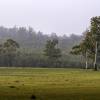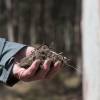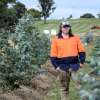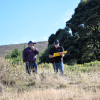
Dougal Morrison leading An Cala into carbon, timber farming with forestry integration
Posted 24 March 2025
Plantation Planning Species, sites and planting On-farm benefits Economic benefits and markets Carbon benefits Tree Alliance
Forestry has long been part of the An Cala farming operations in Tasmania’s Central Midlands and fifth-generation farm manager Dougal Morrison is continuing the practice to aid the Oatlands enterprise’s business diversification into carbon farming
An Cala is an 8,000-hectare property that spreads across both sides of the Midland Highway at St Peters Pass, with more than 18,000 ewes run for meat and wool and several hundred beef cattle as the main sources of income.
Since finishing his education and returning to the farm in 2018, Dougal, who’s father’s family has owned part of St Peters Pass since the 1820s when land grants were distributed, has been on a mission to improve the landscape and the farm’s operations, with forestry playing a key role.
“All of our forestry operations are on land that has previously been harvested or land that is unsuitable to return to pasture,” Dougal said.
“Our plans are about getting the best return on that land, and commercial timber and carbon plantations offer us a worthwhile reward for effort.
“The area grows quite good trees, and forestry helps us diversify our risk through another income stream.
“It also gives us the option to offset the carbon footprint of some of our other commodities by meeting certain environmental wool and meat market certification benchmarks.”
Dougal is part of a Private Forests Tasmania integrated farm forestry demonstration site and was one of three farmers last year to receive a share of the $450,000 Stems for CO2 co-investment program, supported by the State Government’s Renewables, Climate and Future Industries Tasmania initiative.
Under Stems for CO2, about 268 hectares of commercial trees will be planted across the properties of Dougal, Alison Napier, and Julian Devery in Oatlands, St Marys, and Riana, respectively.
Dougal’s project will sequester 94,280 tonnes of CO2e across 27 years* in the first rotation. That’s enough to offset annual emissions from 20,648 cars or 5,427 homes.†

The Tasmanian Government’s $10 million commitment in 2023 to maintaining the state’s net-zero emissions status has been pivotal, with $600,000 allocated to Private Forests Tasmania to co-invest with landowners in establishing plantations for forestry and carbon farming while helping communicate the benefits of growing trees to other farmers and landowners.
Using the funds, Dougal will plant a four-hectare shelterbelt in August 2025 and convert two eucalyptus nitens plantations into radiata pine plantations
The plan is considered a schedule 2 project under the Australian carbon credit units scheme where an existing short rotation plantation forest is converted to a long rotation plantation forest for commercial harvesting of wood products.
One 113-hectare site will be planted in 2025, while the 39-hectare site will be completed in late winter 2026, with Forest Practices Plans and Private Timber Reserves either in action or progressing.
In total, more than 160,000 seedlings will be added to the property for carbon and timber benefits over the plantations’ 27-year lifespan.
“We weighed up whether to convert the land back to agricultural grazing or put it back into trees,” Dougal said.
“At the time, the numbers were really close because wool, land, and cattle were all selling well, and timber was not fantastic.
“But with the carbon project, the numbers came out in front, and it’s probably lucky we went that way because agricultural commodities have dropped in the past four or five years.
“We also contemplated going back to nitens, but we believe there will be a better market for pine in the future.”

Dougal said site preparation would be carried out in autumn and that firebreaks, fencing, and browsing and weed control measures were in place.
“This planting is part of a larger carbon project that will total 453 hectares, some of which we have planted recently,” Dougal said.
“We have learnt a lot about how to achieve the best results from plantation establishment from our experience in the last two years, with a greater focus on browsing management needed.”
Dougal said Climate Friendly was managing the carbon side of his forestry enterprise, while Cross Cut Forestry Consulting’s Chris Ringk was overseeing his plantation establishment.
If you are interested in integrating and growing trees on your property, email Private Forests Tasmania at admin@pft.tas.gov.au or call our free helpline on 1300 661 009 for more information.
*CO2e is carbon dioxide equivalent, a measure used to compare the emissions from greenhouse gases across various sources. Figures calculated by Private Forests Tasmania via Esk Mapping.
†Calculated based on average annual passenger vehicle emissions of 4.6 metric tonnes of CO2e and average annual household emissions of 17.5 metric tonnes of CO2e.





